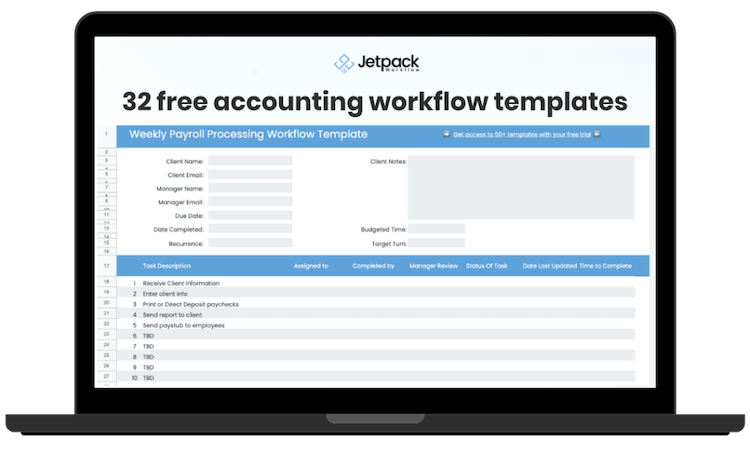5 Key Tips for Onboarding New Employees to Accounting Firms

Did you know that 69% of new employees were more likely to stay with a company for at least three years if the onboarding process was great? Perhaps more jaw-dropping is that about 20% of new employee turnover happens within the first 45 days.
At the risk of stating the obvious, it’s pretty clear how important a smooth and superb onboarding process is for any business, including accounting firms.
With the great resignation trend ongoing, it is even more critical for businesses to work harder toward retaining talent right from the start. That’s why you must have a seamless onboarding process that’s stress-free for you and the new employees.
Bringing in a new employee is a process. However, there is more to do after the interviews are done and employment contracts are signed. So, let’s talk about why it is vital to have an onboarding process and the essential tips to ensure you onboard new employees, effectively.
Why Onboarding is So Important for New Accounting Firm Employees
A good onboarding process for new accounting firm employees should accomplish four things:
Calm Their Nerves
We all know how the first day at work is nerve-wracking. It is like being in a high school cafeteria all over again. You have no idea whether you will get along with your colleagues or if there is a “cool table” during lunch hour. Is everything about the company culture you were told true, or was it just smoke and mirrors?
That’s why it is crucial to have an onboarding plan for your accounting firm that guarantees your new employees are comfortable from the very first day.
Increase Their Productivity Sooner Than Later
While it takes time for one to be fully productive in a new job, the productivity of your new hires will depend on how seamless the onboarding process is.
Do you want an employee to come in and start looking for a different job after the first day of work with your firm? Or have them twirl around in their chairs looking at busy colleagues without knowing what’s expected of them?
Definitely not. Aim at capturing your new employee’s excitement about their new job from the beginning. It will boost their confidence in their decision and increase their productivity.
Increase Their Loyalty to Your Firm
Employee retention is no easy feat, especially during the first year of employment. And their onboarding experience plays a significant role. According to The Wynhurst Group, new employees have a 58% greater chance of staying with the company after three years if the onboarding process is well-structured.
A well-planned and thoughtful onboarding experience removes any necessary confusion among your new hires. It shows them their superiors, immediate colleagues, and most importantly, what is required of them.

5 Tips for Onboarding New Employees to Your Accounting Firm
Are you planning to hire new talent for your accounting firm? If yes, use these tips to ensure your onboarding process is smooth.
1. Have an Onboarding Checklist
The onboarding process is equally engaging for you. There are many things to do during this period. An onboarding checklist ensures you do not miss anything important or spend more time than necessary on any task.
Your checklist should include:
- Offer letter finalization. Have they signed their offer letter? Are they okay with all the details, from the salary to employee benefits and job description? You can invite them to the office to iron out any remaining details.
- Setting up their payroll details. Now that you have a new employee, you want to ensure their correct remuneration, tax, and checking account details are captured.
- Company-issued items. Do your employees receive a mobile phone for work calls? Do they need a new laptop? Perhaps a pair of headphones for remote employees? Credit cards for client expenses? Is their access keycard ready and working? What about email accounts set up and login credentials? All the technology bits your accounting firm uses and your new employee requires must be available on their first day or week of reporting. If there is a need for additional licenses, work towards procuring them before their start date.
- Initial training. Companies conduct initial training for new hires to give them a company tour. This includes showing them the firm’s culture, work schedules, calendars, and workplace norms like dress codes. You can also take the opportunity to train the employee on any extra skills they might need.
Many accounting firms divide the onboarding checklist for new employees into phases. For instance, phase one will include all the items you must take care of before the employee reports. The second phase will consist of what you need to do on the day they report, while the third and possibly the fourth phase is for everything after a week or so of working.
2. Introducing New Hires
Imagine if your new hire was busy with their work and current employees stood by wondering who the person is. Arrange for introductions between the new and existing employees. These introductions help new employees know who does what and who they can turn to if they need help. It will also make it easier for the new employee to integrate with the rest of the team.
The introductions could be in person, especially among people they will be working directly with or if yours is a small office. It is also advisable to do a face-to-face introduction with the senior people in the organization. However, it is recommended you do such introductions in several different ways. It reduces the chances of current employees missing the news of the recently hired employees. Some of the avenues to use are emails, newsletters, social media, memos, and office bulletin boards.
3. Get Your New Employee Embedded Into the Firm’s Workflows
The workflows and rhythm of an accounting firm can be complex for a new employee to learn. Challenges a new employee may face include prioritizing and keeping track of countless client tasks, communicating with other team members, and ensuring nothing falls through the cracks.
Jetpack Workflow is a good tool for helping new employees to keep their heads on straight. The dashboard displays a calendar of current and upcoming tasks, with templates that allow you to duplicate jobs from one client to another since many processes are essentially the same.
4. Schedule Follow-up Meetings
Your employee is here and set up. They have adjusted to their new role successfully. What next? Don’t sit back and assume a new employee’s first few weeks will go smoothly without any hiccups.
Schedule follow-up meetings to check in with them. Are they enjoying their time in the firm? Do they have trouble in any areas? You can schedule these meetings:
- The first week (7 days). During this meeting, you can confirm whether all the necessary onboarding paperwork is complete. You can revisit your onboarding checklist to ensure you ticked off every task. Most importantly, ascertain whether there are any issues to address regarding their job and comfort in the company.
- One month. Find out how the new job is treating them so far. Are they struggling with anything and require extra training? Is their performance satisfactory?
- Three months. By the third month, the employee has learned the basics about their new role and company. One of the concerns is whether their probationary period continues, or are you ready to make the employee permanent? It is also a great time to revisit their role and experience in the company. Are they finally comfortable? What are their professional development needs, and how can you meet them?
Remember to pay close attention to their replies. Give them time to explain and narrate their experiences during this period. It is an excellent way to gather information without coming across as an intimidating employer.
5. Have a Welcome Gift
Remember, the goal is to make the new employee feel like part of the firm from day one. A welcome gift will help break the ice. Most companies have a welcome kit with branded items like coffee mugs, diaries, notebooks, water bottles, tote bags, etc. Better still, include a personalized welcome letter thanking your new employee for being part of your accounting firm for years to come.
Need Help Managing Your Workflows Across Employees?
If you’re looking for simple workflow templates to stay on top of your projects and tasks for clients across your team, access our collection of 32 customizable accounting workflow templates and checklists here. This free resource includes a ton of the most popular accounting templates including monthly bookkeeping, weekly accounting analysis, client onboarding procedures, and common tax return forms.






